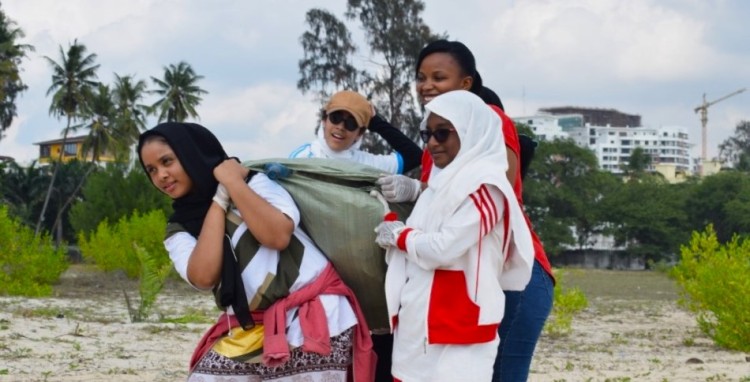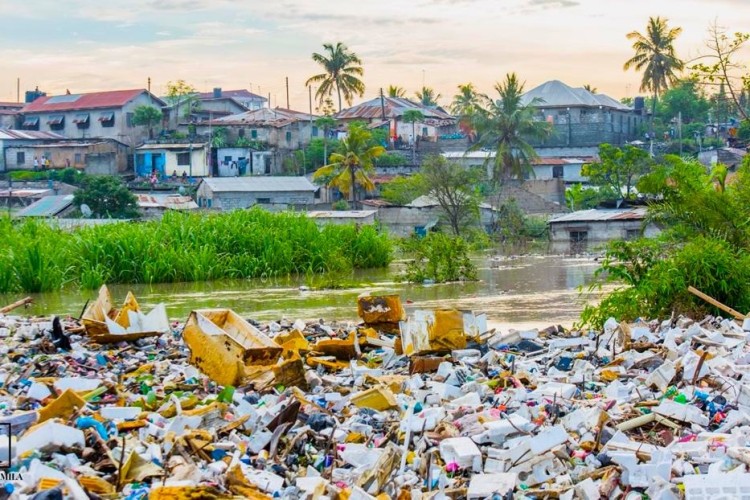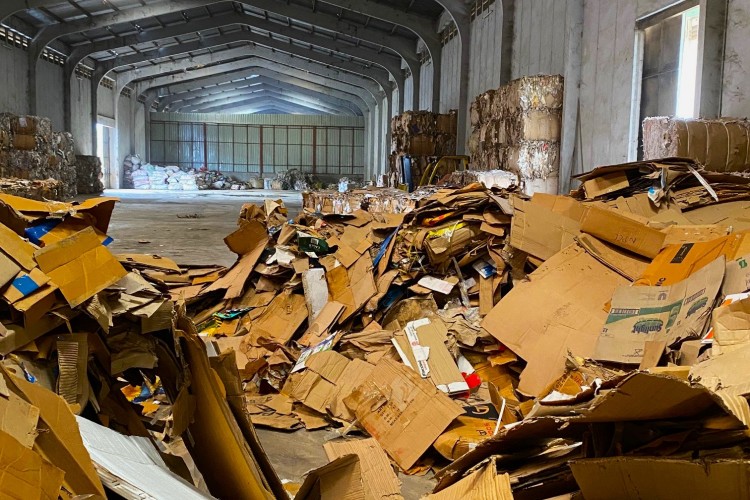“Weka mazingira safi - Usiupotezee uchafu!” (“Keep the environment clean - Do not ignore waste!”)
Solid waste management has become one of the most serious environmental and public health issues confronting cities of Sub-Saharan Africa. Wezesha Mabadiliko (WEMA), an NGO based in mainland Tanzania and current DTP host organisation introduces their upcoming community-based development project. The discussion circulates around possibilities of bans of production and consumption of plastic and advocates for system-wide approaches for managing waste, that includes circular economy models and solutions.
 World Cleanup Day Every year on World Cleanup Day, more than 15 million people in 190 countries collect trash to clean up their communities and the environment. [Foto von Santino Anderer, No Copyright]
World Cleanup Day Every year on World Cleanup Day, more than 15 million people in 190 countries collect trash to clean up their communities and the environment. [Foto von Santino Anderer, No Copyright]
Why Africa urgently needs to address its waste management problem:
Although the production and consumption of plastics are relatively low in Africa (5% and 4%, respectively) compared to China, North America, Western Europe, and India, global environmental emission of plastics due to mismanagement of waste are highest in Africa, with recent estimates suggest Africa contributed around 24% of the global emissions of mismanaged plastic waste (UN Environment, 2018). The United Nations have estimated that only 10% of plastic waste generated in Africa are appropriately managed, with a fraction undergoing removal by waste incineration. Waste incineration, which increases atmospheric emission of greenhouse gases (which contribute to climate change), toxic chemicals (e.g., dioxins and furans), and atmospheric particles (that may cause respiratory diseases), is widely practised in most African countries due to lack of adequate infrastructure. Without drastic changes in plastic waste management, the total municipal plastic waste generated across Africa is projected to increase from 19.2 million tonnes in 2015 to 72 million tonnes by 2060.
This is why we not only need bans of production and consumption of plastic but system-wide approaches for managing waste, that includes circular economy models and solutions.
“USIUPOTEZEE UCHAFU” – “DO NOT IGNORE WASTE”
Solid waste management has become one of the most serious environmental and public health issues confronting cities of Sub-Saharan Africa. Rapid urbanization, economic growth, and changes in lifestyles and consumption patterns have resulted in a remarkable increase in waste volume. However, such an increase has never been matched with the pace of economic growth necessary for supporting the required infrastructure for effective solid waste management service provision. This has resulted in poor waste management service in many Sub-Saharan African cities (Omar, 2019).
“WEKA MAZINGIRA SAFI” - “KEEP THE ENVIRONMENT CLEAN”
In Tanzania, despite generating nearly 7 million tons annually, only 32.72% of the generated waste is collected countrywide (United Republic of Tanzania, 2021). Solid waste generated in cities accounts for nearly 10% of the total generated waste in the country. Moreover, it is estimated that over 90% of solid waste generated in urban areas are not properly disposed and hence contribute to pollution of the water sources both underground and surface water. Generally, inadequate waste management is a major cause of air, soil, and water pollution in urban areas (United Republic of Tanzania, 2021). This in consequence has been causing several health and environmental impacts including the incidence of diseases, such as increased cases of cholera, malaria, typhoid fever, dengue fever, and Zika; occurrences of flood incidences and deterioration of beach quality (Omar & Bullu, 2022). In most cases lacking capacities to collect generated solid waste, and inadequate solid waste treatment are the root causes of pollution in Tanzania (United Republic of Tanzania, 2022).
“WEKA UWANJA WA TAIFA SAFI” - “KEEP UWANJA WA TAIFA CLEAN”
We are Wezesha Mabadiliko (WEMA), an NGO based in mainland Tanzania, who engage in community-based development projects. The mission of our next project targets the community of Uwanja wa Taifa, Morogoro, to develop adequate waste disposal behaviour in public areas and to actively support the reduction of environmental pollution. Currently many people dispose of their garbage on the streets, which results in heavy pollution of public places. This in turn has negative impact on health and environment. A survey among the population of Morogoro revealed that the main reasons for improper waste management are lack of awareness and infrastructure regarding waste disposal and poor law enforcement. Whereas, given our powers, our focus is on the first two points.
“TUPA TAKA HUMU” – “DISPOSE WASTE HERE”
By exchanging with the regional waste company, which is privately owned, but work under the assistance and guidance of municipal authorities, we want to identify with them challenges regarding proper waste management, ways-out and how to do it. This will create a win-win situation with the community. Through a conversation with local community leaders, which are responsible for authority activities in the project area, we expect to exchange ideas based on the waste disposal background, to identify the best ways to involve the community members in the project and to strengthen their capacities so that we achieve proper waste disposal in Uwanja wa Taifa together.
Our target group for proper waste disposal education will be youth and women. Youth are the future of our society and currently mainly responsible for improper waste disposal around the public places by throwing used papers, plastic bags, bottles, and other form of waste in the environment, because mostly they are around the places for different activities. Women are mostly responsible for the household environment based on the daily domestic activities they fulfil, though these group can influence improper waste disposal anywhere given by their guiding role they have in family. These education activities will align with the installation of public dustbins and reminder signs for practical and behaviour changes, and a cleaning up event to achieve proper waste disposal in Uwanja wa Taifa, Morogoro.
Table of References:
- Omar, H. M. & Bullu, S. L. (2022). Assessment of solid waste management practices in Tanzania’s cities. Global Journal of Engineering and Technology Advances, 13(01), 108–119. https://doi.org/10.30574/gjeta.2022.13.1.0180
- Omar, H. M., Bullu, S. L. & Kiwango, N. (2019). The Potential and Challenges of the Informal Solid Waste Collection Services: The Case of Sandali Ward, in Temeke Municipality, Dar es Salaam-Tanzania. GSJ, 7(11). 470-488.
- United Nations Environment Programme. (2018). Mapping of Global Plastics Value Chain and Plastic Losses to the Environment (With a Particular Focus on Marine Environment). https://www.unep.org/resources/report/mapping-global-plastics-value-chain-and-plastics-losses-environment-particular
- United Republic of Tanzania. (2022). National environmental master plan for strategic Interventions (2022-2023). Vice president’s office. https://www.vpo.go.tz/uploads/publications/en-1654509088-MASTER%20PLAN-English_eBOOK_FINAL.pdf
- United Republic of Tanzania. (2021). National environmental policy, 2021. Vice president’s office. https://www.vpo.go.tz/uploads/publications/en-1644923087-NATIONAL%20%20ENVIRONMENTAL%20POLICY%202021%20new.pdf



